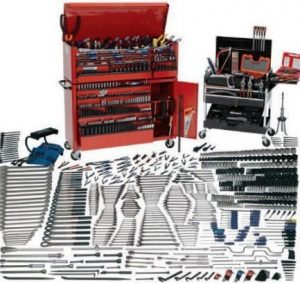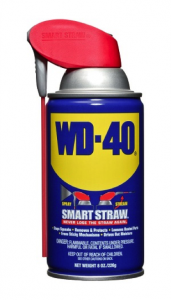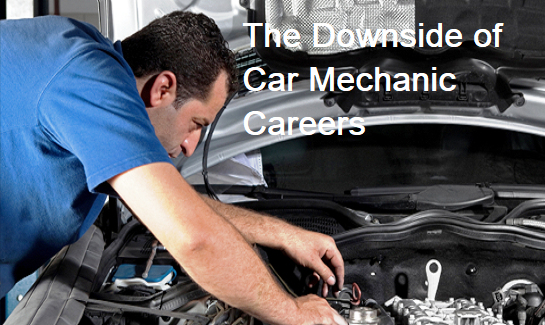The Downside of a Car Mechanic Career
Hanging around cars is fun. In fact, you might consider a car mechanic career because of your love of automobiles. However, before you invest in a professional set of tools and enroll in expensive formal training, let’s talk about the downside of pursuing a car mechanic career. This article isn’t meant to talk you out of something you truly want to do. The goal is to provide an insider look into a career that isn’t as glamorous as it appears on the surface.
Daily Responsibilities of a Car Mechanic

Before we start digging into the individual problems associated with a car mechanic career let’s talk about the daily responsibilities of the average technician. Car mechanics find themselves doing just about anything on the automobile. Whether it’s performing a simple oil change or diagnosing a check engine light problem technicians must be ready to tackle any automotive issue.
The upside to this is every day becomes unique from the day before. With that said, many repetitive tasks exist, such as brake jobs and tire rotations. A good technician realizes, no matter how much experience you have under your belt, you will learn something new every day. Unfortunately, some of these learning experiences can actually cost you money. We’ll get into more of that below.
Before we move on, let’s talk about a less glamorous side to a car mechanic career. Auto repair shops don’t provide a maid service to clean up after you. Keeping the shop clean becomes important for many service centers as it conveys a sense of organization to potential customers. Therefore, auto mechanics spend a large part of their day mopping floors, emptying trash and cleaning up after extremely messy repairs. If this technician receives compensation on a flat rate basis, all of this work is done for free. You can learn more about this pay plan, on an article we wrote about how auto mechanics get paid.
Hazards of a Car Mechanic Career

Most of the auto mechanics I’ve worked with got into the business without thinking about the long-term risks associated with the job. This is not an exclusive feature of the automotive industry. Many skilled trades require hard physical labor and exposure to chemicals. So let’s talk about some of these hazardous materials.
Car mechanics find themselves around a wide range of chemicals and petroleum products. We can divide these into two categories. There’s the stuff that’s inside the car and the materials used in the service of the automobile. The car itself is filled with oil, gas, Freon, brake fluid and several other types of hydraulic oil. Mechanics must protect themselves from these fluids.
In addition, you’ll find corrosive chemicals used in the service of that automobile. Auto repair businesses consider these materials as shop supplies. Of course, we use carburetor cleaner, brake cleaner and fuel injection cleaner during common maintenance services. Technicians also find it necessary to use some miracle fluids to service automobiles. Spray chemicals like penetrating oil, white lithium grease and even WD-40 shouldn’t wind up into a pair of human lungs. Very few mechanics take the time to put on a mask and gloves to protect themselves from these chemical hazards.
Auto Mechanics Sometimes Work for Free
No matter how skilled an automotive technician becomes they will make a mistakes. In the retail automotive service business, we call this a comeback. This is when an automotive consumer finds it necessary to return to the service center for the same exact problem they paid to have repaired. Flat rate mechanics must perform this service again without charge to the customer and therefore without compensation.
Lack of customers becomes another issue facing these paid by the job mechanics. You only get paid to work on cars. When no customers exist, then you wind up mopping the floors and emptying the trash without compensation. Unfortunately, this happens more than people realize. And as cars become more reliable with far less scheduled maintenance, this situation will only get worse.
Car Mechanics Work Very Hard

Those on the outside looking in might not realize how physical this job can be. Although this remains on par with other skilled trades, I know more auto mechanics that lost fingers and toes than plumbers or electricians. However, I think it’s the long term physical toll that many don’t realize exist. Long-term hearing damage remains a common occurrence with car mechanics. Air chisels, half inch drive impact guns used to remove the lug nuts and air ratchets make more noise than many realize.
Another area of the human body that a car mechanic career can take its toll on becomes the back and knees. If you can imagine getting on your knees and setting the lift up on every automobile you work on, you can see how this adds up over time. Another thing to consider is the way mechanics bend over the engine compartment and service heavy components like alternators and batteries. Lifting the cylinder head off of a V-8 engine a couple of hundred times over the years can make your back ache.
The last thing to discuss becomes the environmental conditions that face an auto mechanic. Very few auto repair centers provide air-conditioning for technicians. With that said, most of the shops do provide heat. Unfortunately, these environmental controls might take the edge off, but certainly doesn’t remove the pain and suffering that comes from working outside. A mechanic diagnosing a no start condition in the parking lot of a Phoenix, Arizona repair center will back me up on this.
Sidestepping the Dangers Facing an Auto Mechanic
I wanted to end this article focusing on the downsides of a car mechanic career with some uplifting and positive news. You can mitigate all the potential hazards laid out in this article to some extent. Mechanics should always wear eye protection, back belts, work gloves and respirator masks to avoid many of the physical hazards facing them.
As far as the chemicals, auto repair centers are required to supply detailed information about the dangers of dealing with these materials. These MSDS (material safety data sheets) not only tell you what these products can do to you, but also supply information on how to properly use them to avoid harmful side effects.


